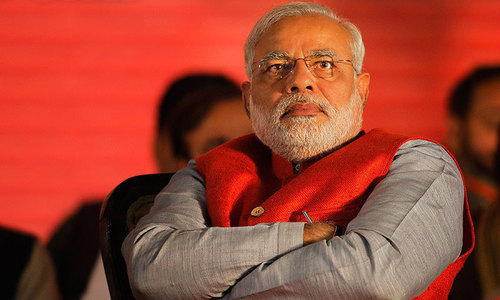WHOEVER wins the Indian elections on Thursday is destined to face the economic and political challenges with roots stretching from the bubbling Iran-US military stand-off to the Sino-American business spat.
Any imaginative ruler would convert the China-US fracas to India’s advantage by aligning Delhi’s policies with China’s global plans. Prime Minister Imran Khan should of course be pleased that the exit polls have shown Prime Minister Narendra Modi as the probable winner. Going by his stated preference, he should find a more agreeable Delhi under a second BJP government.
A corollary to Khan’s approval for a right-wing establishment in India is that while the two countries may solve the intractable problem of Kashmir, it should matter least, if at all, that the preferred interlocutor would play havoc with the rest of Indian democracy. My surmise is that India-Pakistan relations would improve, nevertheless, chiefly since there is no appetite among major powers for a February-like stand-off.
The winner of Thursday’s results will inevitably brace for domestic strife too, spurred by record unemployment and unabated agrarian distress. Religious and caste flashpoints are perennially looming. To say that the proverbial crown of thorns would go to Mr Modi could be fraught with surprises though. Exit polls have predicted his victory but few in the opposition would take that seriously. Close cousins of exit polls, the opinion polls, are equally a gamble.
The winner of Thursday’s results will brace for domestic strife, spurred by record unemployment and agrarian distress.
The person who introduced psephology in Indian elections won his laurels by predicting the absolute exact number of seats Rajiv Gandhi would win in 1989, but he got the states from where they would come completely wrong. It was chancy despite an aura of scientific precision. Exit pollsters on their part missed the 2004 and 2009 elections by a stretch, on both counts predicting victory for Atal Behari Vajpayee’s Bharatiya Janata Party (BJP) and on both occasions they were made to eat crow.
It seems Manmohan Singh was never on the radar of the pollsters as prime minister. Following the 2009 adverse outcome for the party, the BJP was so upset that it found an alibi for its defeat in the electronic voting machines for the debacle. Its young spokesman G.V.L. Narasimha Rao wrote a tome ‘explaining’ how the EVMs could be manipulated by the Congress. Today, the boot is on the other foot, and it is the opposition’s turn to doubt the EVMs. Why can’t there be the good old ballot paper for greater trust?
Having said that, what does one make of the reasons for coming up with the iffy exit polls before the results are out? One obvious explanation is that it moves the markets. As happens with pulse monitors in the ICU, a flat line on the screen, as opposed to up-and-down movements, is considered calamitous for the stock markets too. Exit polls work these undulating lifelines for the punters to rake it in before the actual results are out.
In the current scenario, one can see an even larger purpose for the exit polls. They give the fence sitters in the fray a reason to fear the outcome, a fear that could nudge many or some of them to gravitate towards the ruling establishment.
In a close race in which a single MP could save the day for either side, the exit polls would no doubt stir things up for the unattached winners thus giving considerable advantage to Prime Minister Modi. It is to avoid this panic and lurking surrender that opposition stalwarts like Chandrababu Naidu and Sharad Pawar are working overtime to touch base with the most vulnerable and potentially critical neutral winners. This lot includes the chief ministers of Odisha and Telangana and the regional rival of Naidu too.
Now step back from this rugby scrum. What happens if Modi gets a second term? And what could go right or wrong if the opposition gets its act together in time in the numbers game should the match be found wide open, contrary to the exit polls predictions?
To fortify this scenario the Congress has declared that it would not press for the prime minister’s job if that would help keep Modi out. The urge to keep Modi out is thus strong glue. In that case, numbers permitting, there could be an opposition government with Congress support.
There’s a catch here, or possibly more. There are business lobbies that many in the opposition may not be able to say no to. What if they don’t like Mayawati who is probably too independent-minded for them, and with a social reforms agenda they are not comfortable with? Or, if there is pressure to keep the Aam Aadmi Party or Mamata Banerjee out?
There could be repercussions. Mayawati shores up fragile Congress governments in Rajasthan and Madhya Pradesh. The numbers game could become a tightrope walk for the opposition unless they are stacked stridently more generously in favour of the opposition.
If a weak opposition government comes in, it would inevitably be subject to daily blackmail from within and face dire threats from the Hindutva street fighters outside parliament. The political and economic crisis with its roots in the Gulf has the potential to go seriously critical for India. The last time it happened with Iraq, but now Iran is in the US cross hairs with support from Saudi Arabia and Israel, exactly the allies that came together against Saddam Hussein and Muammar Qadhafi.
Iraq’s fall became possible because the Soviet Union had recently collapsed. For India, shooting oil prices combined with loss of the Soviet captive market had prompted the rise of Manmohan Singh’s free markets policies. Will India tackle the looming challenges at home and abroad by moving further to the right, or would it fight the fight as an enviable democracy it once was? The answer could be out on Thursday.
The writer is Dawn’s correspondent in Delhi.
Published in Dawn, May 21st, 2019
















































